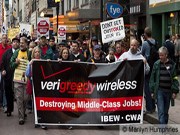News
Telecom multinationals form group on human rights but ignore employees

UNI Global Union welcomed the announcement that six major telecommunications multinationals have begun discussions on how to protect and promote human rights for their customers but if the companies are making a serious commitment to theses issues, they must also respect the human rights of their own employees, including their right to form unions and bargain collectively.
Swedish-Finnish TeliaSonera, Norwegian Telenor, Vodafone UK, Spanish Telefonica, Finnish-German Nokia Siemens and French Alcatel have recently formed a group to focus on human rights, according to an article on the website of Swedish newspaper Dagens Nyheter published on 17 November.
“We are calling on these six multinationals to start showing their commitment to human rights in their own businesses,” said Head of UNI ICTS Marcus Courtney. “Labour rights are human rights and we hope that these multinationals will show their leadership in the industry by allowing all their employees around the world to join unions and bargain collectively.”
According to the article, the companies will work with the United Nations “Ruggie Principles” of Protect, Respect and Remedy, which have moved the human rights’ agenda in a new direction. While these principles recognise labour rights as core human rights, many of these companies have failed to address these issues at a global level.
“The Ruggie Principles place an obligation on business to respect human rights and the responsibility to act with due diligence to identify and account for the impact of their business on human rights,” said UNI General Secretary Philip Jennings. “We invite the companies in this group to open a dialogue with UNI to address labour rights issues and ensure that all their workers around the world are have a voice in the workplace to ensure their rights are protected.”
UNI has called on telecommunications multinationals to sign global agreements on workers’ rights. Of the companies in the newly formed rights group, only Telefonica has done so. However, the dialogue between unions and Telefonica has been tested recently due to breaches of human rights.
In Mexico, Telefonica supports a “protection union” that acts on behalf of management and not workers. The company actively interfered to shut down three government supervised elections where the workers would have an opportunity to elect a democratic trade union. In Ireland, the company has refused for over four years to recognise the right of a local union to organise and bargain collectively. In El Salvador, workers were fired when they tried to organise and form a trade union. The Ministry of Labour issued a recommendation that the workers be hired back but the company refused to do so.
Vodafone owns more than 40 percent of US-based Verizon Wireless, where management has bitterly opposed workers attempts to unionise.
UNI is working with Telefonica at the local and global level to address these issues in an open and honest manner. UNI believes that the company’s commitment to human rights must extend to its own workers.
Teliasonera has refused to meet with UNI to discuss a global agreement. The company says they place an emphasis on “Freedom of association and effective recognition of the right to collective bargaining”. In countries where the law and labour relations practices provide sufficient protection for trade union rights, like in the Nordic region, its policy may be enough to ensure workers rights are respected. However, national laws and institutions are often insufficient to ensure that workers are able to effectively exercise their rights to freedom of association. Where that is the case, TeliaSonera’s policy is unlikely to fill the gaps.
Telenor has no union members in its extensive business in Malaysia and Thailand and outsources large parts of their operations, which stymie union organising. It is promising, however, that Telenor have indicated they are willing to begin dialogue with UNI in 2012 and we await the outcome of these discussions to address labour rights issues at the global level.
The issues at Telenor and Teliasonera demonstrate that the companies are not at a stage where they can effectively deal with labour issues and UNI be an effective partner in beginning to work on the issues at a global level.

